


2017 Land Cruiser Prado (J150 facelift 2017) 5Door
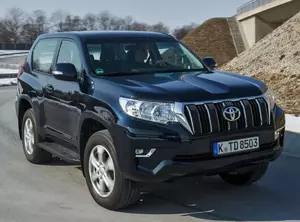
2017 Land Cruiser Prado (J150 facelift 2017) 3Door
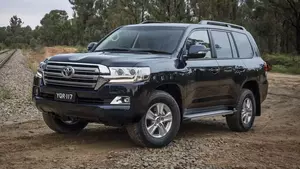
2017 Land Cruiser (J200 facelift 2017)

2013 Land Cruiser Prado (J150 facelift 2013)

2013 Land Cruiser (J200 facelift 2013)

2010 Land Cruiser Prado (J150)

2008 Land Cruiser (J200)

2004 Land Cruiser 79 (HZJ79)
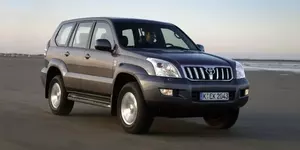
2002 Land Cruiser (120) Prado
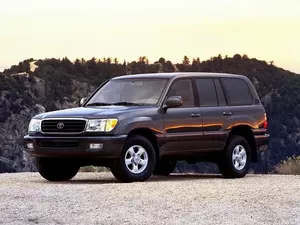
1998 Land Cruiser 100 J10
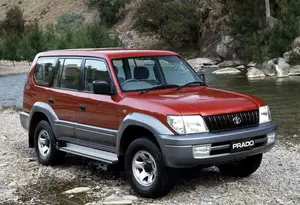
1987 Land Cruiser 90 Prado

1990 Land Cruiser 80

1984 Land Cruiser 100 J7

| Vehicle | Curb weight | Difference from world's smallest | Weight to power ratio | 0—60 mph acceleration ratio | Consumption ratio |
|---|---|---|---|---|---|
| 2.7 |
2095 kg / 4619 lbs |
1670 kg (3682 lbs) heavier | 13 kg to 1 hp | 159 kg/s (351 lbs/s) |
168 kg/L (370 lbs/L) |
| 2.8 D-D4 |
2165 kg / 4774 lbs |
1740 kg (3837 lbs) heavier | 12 kg to 1 hp | 188 kg/s (415 lbs/s) |
293 kg/L (646 lbs/L) |
| Vehicle | 2.7 |
|---|---|
| Curb weight |
2095 kg / 4619 lbs |
| Difference from world's smallest | 1670 kg (1670 lbs) heavier |
| Weight to power ratio | 13 kg to 1 hp |
| 0—60 mph acceleration ratio | 159 kg/s (351 lbs/s) |
| Consumption ratio |
168 kg/L (370 lbs/L) |
| Vehicle | 2.8 D-D4 |
| Curb weight |
2165 kg / 4774 lbs |
| Difference from world's smallest | 1740 kg (1740 lbs) heavier |
| Weight to power ratio | 12 kg to 1 hp |
| 0—60 mph acceleration ratio | 188 kg/s (415 lbs/s) |
| Consumption ratio |
293 kg/L (646 lbs/L) |

| Vehicle | Curb weight | Difference from world's smallest | Weight to power ratio | 0—60 mph acceleration ratio | Consumption ratio |
|---|---|---|---|---|---|
| 2.8 D-4D |
2065 kg / 4553 lbs |
1640 kg (3616 lbs) heavier | 12 kg to 1 hp | 180 kg/s (397 lbs/s) |
287 kg/L (633 lbs/L) |
| Vehicle | 2.8 D-4D |
|---|---|
| Curb weight |
2065 kg / 4553 lbs |
| Difference from world's smallest | 1640 kg (1640 lbs) heavier |
| Weight to power ratio | 12 kg to 1 hp |
| 0—60 mph acceleration ratio | 180 kg/s (397 lbs/s) |
| Consumption ratio |
287 kg/L (633 lbs/L) |

| Vehicle | Curb weight | Difference from world's smallest | Weight to power ratio | 0—60 mph acceleration ratio | Consumption ratio |
|---|---|---|---|---|---|
| GXL 4.5d V8 |
2740 kg / 6042 lbs |
2315 kg (5105 lbs) heavier | 10 kg to 1 hp | - |
288 kg/L (635 lbs/L) |
| VX 4.5d V8 |
2740 kg / 6042 lbs |
2315 kg (5105 lbs) heavier | 10 kg to 1 hp | - |
288 kg/L (635 lbs/L) |
| GX 4.5d V8 |
2640 kg / 5821 lbs |
2215 kg (4884 lbs) heavier | 10 kg to 1 hp | - |
278 kg/L (613 lbs/L) |
| 5.7 V8 |
2638 kg / 5817 lbs |
2213 kg (4880 lbs) heavier | 7 kg to 1 hp | - |
157 kg/L (346 lbs/L) |
| 4.6 V8 |
2585 kg / 5700 lbs |
2160 kg (4763 lbs) heavier | 8 kg to 1 hp | 315 kg/s (695 lbs/s) |
186 kg/L (410 lbs/L) |
| Vehicle | GXL 4.5d V8 |
|---|---|
| Curb weight |
2740 kg / 6042 lbs |
| Difference from world's smallest | 2315 kg (2315 lbs) heavier |
| Weight to power ratio | 10 kg to 1 hp |
| 0—60 mph acceleration ratio | - |
| Consumption ratio |
288 kg/L (635 lbs/L) |
| Vehicle | VX 4.5d V8 |
| Curb weight |
2740 kg / 6042 lbs |
| Difference from world's smallest | 2315 kg (2315 lbs) heavier |
| Weight to power ratio | 10 kg to 1 hp |
| 0—60 mph acceleration ratio | - |
| Consumption ratio |
288 kg/L (635 lbs/L) |
| Vehicle | GX 4.5d V8 |
| Curb weight |
2640 kg / 5821 lbs |
| Difference from world's smallest | 2215 kg (2215 lbs) heavier |
| Weight to power ratio | 10 kg to 1 hp |
| 0—60 mph acceleration ratio | - |
| Consumption ratio |
278 kg/L (613 lbs/L) |
| Vehicle | 5.7 V8 |
| Curb weight |
2638 kg / 5817 lbs |
| Difference from world's smallest | 2213 kg (2213 lbs) heavier |
| Weight to power ratio | 7 kg to 1 hp |
| 0—60 mph acceleration ratio | - |
| Consumption ratio |
157 kg/L (346 lbs/L) |
| Vehicle | 4.6 V8 |
| Curb weight |
2585 kg / 5700 lbs |
| Difference from world's smallest | 2160 kg (2160 lbs) heavier |
| Weight to power ratio | 8 kg to 1 hp |
| 0—60 mph acceleration ratio | 315 kg/s (695 lbs/s) |
| Consumption ratio |
186 kg/L (410 lbs/L) |

| Vehicle | Curb weight | Difference from world's smallest | Weight to power ratio | 0—60 mph acceleration ratio | Consumption ratio |
|---|---|---|---|---|---|
| 2.8 D-4D |
2120 kg / 4675 lbs |
1695 kg (3738 lbs) heavier | 12 kg to 1 hp | 175 kg/s (386 lbs/s) |
286 kg/L (631 lbs/L) |
| 2.7 VVT-i |
2850 kg / 6284 lbs |
2425 kg (5347 lbs) heavier | 17 kg to 1 hp | 274 kg/s (604 lbs/s) |
228 kg/L (503 lbs/L) |
| 4.0 V6 Dual VVT-i |
2900 kg / 6395 lbs |
2475 kg (5458 lbs) heavier | 10 kg to 1 hp | 279 kg/s (615 lbs/s) |
269 kg/L (593 lbs/L) |
| 3.0 D-4D |
2990 kg / 6593 lbs |
2565 kg (5656 lbs) heavier | 17 kg to 1 hp | - |
369 kg/L (814 lbs/L) |
| Vehicle | 2.8 D-4D |
|---|---|
| Curb weight |
2120 kg / 4675 lbs |
| Difference from world's smallest | 1695 kg (1695 lbs) heavier |
| Weight to power ratio | 12 kg to 1 hp |
| 0—60 mph acceleration ratio | 175 kg/s (386 lbs/s) |
| Consumption ratio |
286 kg/L (631 lbs/L) |
| Vehicle | 2.7 VVT-i |
| Curb weight |
2850 kg / 6284 lbs |
| Difference from world's smallest | 2425 kg (2425 lbs) heavier |
| Weight to power ratio | 17 kg to 1 hp |
| 0—60 mph acceleration ratio | 274 kg/s (604 lbs/s) |
| Consumption ratio |
228 kg/L (503 lbs/L) |
| Vehicle | 4.0 V6 Dual VVT-i |
| Curb weight |
2900 kg / 6395 lbs |
| Difference from world's smallest | 2475 kg (2475 lbs) heavier |
| Weight to power ratio | 10 kg to 1 hp |
| 0—60 mph acceleration ratio | 279 kg/s (615 lbs/s) |
| Consumption ratio |
269 kg/L (593 lbs/L) |
| Vehicle | 3.0 D-4D |
| Curb weight |
2990 kg / 6593 lbs |
| Difference from world's smallest | 2565 kg (2565 lbs) heavier |
| Weight to power ratio | 17 kg to 1 hp |
| 0—60 mph acceleration ratio | - |
| Consumption ratio |
369 kg/L (814 lbs/L) |

| Vehicle | Curb weight | Difference from world's smallest | Weight to power ratio | 0—60 mph acceleration ratio | Consumption ratio |
|---|---|---|---|---|---|
| 2.8 D-4D |
2065 kg / 4553 lbs |
1640 kg (3616 lbs) heavier | 12 kg to 1 hp | 171 kg/s (377 lbs/s) |
279 kg/L (615 lbs/L) |
| 4.6 V8 |
2510 kg / 5535 lbs |
2085 kg (4598 lbs) heavier | 8 kg to 1 hp | 306 kg/s (675 lbs/s) |
189 kg/L (417 lbs/L) |
| 4.5 V8 |
2510 kg / 5535 lbs |
2085 kg (4598 lbs) heavier | 9 kg to 1 hp | 295 kg/s (650 lbs/s) |
264 kg/L (582 lbs/L) |
| Vehicle | 2.8 D-4D |
|---|---|
| Curb weight |
2065 kg / 4553 lbs |
| Difference from world's smallest | 1640 kg (1640 lbs) heavier |
| Weight to power ratio | 12 kg to 1 hp |
| 0—60 mph acceleration ratio | 171 kg/s (377 lbs/s) |
| Consumption ratio |
279 kg/L (615 lbs/L) |
| Vehicle | 4.6 V8 |
| Curb weight |
2510 kg / 5535 lbs |
| Difference from world's smallest | 2085 kg (2085 lbs) heavier |
| Weight to power ratio | 8 kg to 1 hp |
| 0—60 mph acceleration ratio | 306 kg/s (675 lbs/s) |
| Consumption ratio |
189 kg/L (417 lbs/L) |
| Vehicle | 4.5 V8 |
| Curb weight |
2510 kg / 5535 lbs |
| Difference from world's smallest | 2085 kg (2085 lbs) heavier |
| Weight to power ratio | 9 kg to 1 hp |
| 0—60 mph acceleration ratio | 295 kg/s (650 lbs/s) |
| Consumption ratio |
264 kg/L (582 lbs/L) |

| Vehicle | Curb weight | Difference from world's smallest | Weight to power ratio | 0—60 mph acceleration ratio | Consumption ratio |
|---|---|---|---|---|---|
| 3.0 TD |
2165 kg / 4774 lbs |
1740 kg (3837 lbs) heavier | 13 kg to 1 hp | 195 kg/s (430 lbs/s) |
267 kg/L (589 lbs/L) |
| 4.0 i |
2125 kg / 4686 lbs |
1700 kg (3749 lbs) heavier | 8 kg to 1 hp | 244 kg/s (538 lbs/s) |
197 kg/L (434 lbs/L) |
| Vehicle | 3.0 TD |
|---|---|
| Curb weight |
2165 kg / 4774 lbs |
| Difference from world's smallest | 1740 kg (1740 lbs) heavier |
| Weight to power ratio | 13 kg to 1 hp |
| 0—60 mph acceleration ratio | 195 kg/s (430 lbs/s) |
| Consumption ratio |
267 kg/L (589 lbs/L) |
| Vehicle | 4.0 i |
| Curb weight |
2125 kg / 4686 lbs |
| Difference from world's smallest | 1700 kg (1700 lbs) heavier |
| Weight to power ratio | 8 kg to 1 hp |
| 0—60 mph acceleration ratio | 244 kg/s (538 lbs/s) |
| Consumption ratio |
197 kg/L (434 lbs/L) |

| Vehicle | Curb weight | Difference from world's smallest | Weight to power ratio | 0—60 mph acceleration ratio | Consumption ratio |
|---|---|---|---|---|---|
| 4.7i V8 |
2555 kg / 5634 lbs |
2130 kg (4697 lbs) heavier | 9 kg to 1 hp | 294 kg/s (648 lbs/s) |
177 kg/L (390 lbs/L) |
| 4.5D V8 |
2640 kg / 5821 lbs |
2215 kg (4884 lbs) heavier | 11 kg to 1 hp | 322 kg/s (710 lbs/s) |
259 kg/L (571 lbs/L) |
| Vehicle | 4.7i V8 |
|---|---|
| Curb weight |
2555 kg / 5634 lbs |
| Difference from world's smallest | 2130 kg (2130 lbs) heavier |
| Weight to power ratio | 9 kg to 1 hp |
| 0—60 mph acceleration ratio | 294 kg/s (648 lbs/s) |
| Consumption ratio |
177 kg/L (390 lbs/L) |
| Vehicle | 4.5D V8 |
| Curb weight |
2640 kg / 5821 lbs |
| Difference from world's smallest | 2215 kg (2215 lbs) heavier |
| Weight to power ratio | 11 kg to 1 hp |
| 0—60 mph acceleration ratio | 322 kg/s (710 lbs/s) |
| Consumption ratio |
259 kg/L (571 lbs/L) |

| Vehicle | Curb weight | Difference from world's smallest | Weight to power ratio | 0—60 mph acceleration ratio | Consumption ratio |
|---|---|---|---|---|---|
| 4.5TD V8 |
2200 kg / 4851 lbs |
1775 kg (3914 lbs) heavier | 11 kg to 1 hp | - | - |
| 4.2 TD 24V |
2200 kg / 4851 lbs |
1775 kg (3914 lbs) heavier | 13 kg to 1 hp | - | - |
| Vehicle | 4.5TD V8 |
|---|---|
| Curb weight |
2200 kg / 4851 lbs |
| Difference from world's smallest | 1775 kg (1775 lbs) heavier |
| Weight to power ratio | 11 kg to 1 hp |
| 0—60 mph acceleration ratio | - |
| Consumption ratio | - |
| Vehicle | 4.2 TD 24V |
| Curb weight |
2200 kg / 4851 lbs |
| Difference from world's smallest | 1775 kg (1775 lbs) heavier |
| Weight to power ratio | 13 kg to 1 hp |
| 0—60 mph acceleration ratio | - |
| Consumption ratio | - |

| Vehicle | Curb weight | Difference from world's smallest | Weight to power ratio | 0—60 mph acceleration ratio | Consumption ratio |
|---|---|---|---|---|---|
| 2.7 i 16V 4WD |
1880 kg / 4145 lbs |
1455 kg (3208 lbs) heavier | 12 kg to 1 hp | - | - |
| 3.0 D-4D |
1840 kg / 4057 lbs |
1415 kg (3120 lbs) heavier | 11 kg to 1 hp | 151 kg/s (333 lbs/s) | - |
| 4.0 V6 |
1935 kg / 4267 lbs |
1510 kg (3330 lbs) heavier | 8 kg to 1 hp | 215 kg/s (474 lbs/s) |
143 kg/L (315 lbs/L) |
| Vehicle | 2.7 i 16V 4WD |
|---|---|
| Curb weight |
1880 kg / 4145 lbs |
| Difference from world's smallest | 1455 kg (1455 lbs) heavier |
| Weight to power ratio | 12 kg to 1 hp |
| 0—60 mph acceleration ratio | - |
| Consumption ratio | - |
| Vehicle | 3.0 D-4D |
| Curb weight |
1840 kg / 4057 lbs |
| Difference from world's smallest | 1415 kg (1415 lbs) heavier |
| Weight to power ratio | 11 kg to 1 hp |
| 0—60 mph acceleration ratio | 151 kg/s (333 lbs/s) |
| Consumption ratio | - |
| Vehicle | 4.0 V6 |
| Curb weight |
1935 kg / 4267 lbs |
| Difference from world's smallest | 1510 kg (1510 lbs) heavier |
| Weight to power ratio | 8 kg to 1 hp |
| 0—60 mph acceleration ratio | 215 kg/s (474 lbs/s) |
| Consumption ratio |
143 kg/L (315 lbs/L) |

| Vehicle | Curb weight | Difference from world's smallest | Weight to power ratio | 0—60 mph acceleration ratio | Consumption ratio |
|---|---|---|---|---|---|
| 4.2 TD |
2650 kg / 5843 lbs |
2225 kg (4906 lbs) heavier | 13 kg to 1 hp | 205 kg/s (452 lbs/s) |
239 kg/L (527 lbs/L) |
| 4.7 V8 32V |
2260 kg / 4983 lbs |
1835 kg (4046 lbs) heavier | 10 kg to 1 hp | 213 kg/s (470 lbs/s) |
136 kg/L (300 lbs/L) |
| Vehicle | 4.2 TD |
|---|---|
| Curb weight |
2650 kg / 5843 lbs |
| Difference from world's smallest | 2225 kg (2225 lbs) heavier |
| Weight to power ratio | 13 kg to 1 hp |
| 0—60 mph acceleration ratio | 205 kg/s (452 lbs/s) |
| Consumption ratio |
239 kg/L (527 lbs/L) |
| Vehicle | 4.7 V8 32V |
| Curb weight |
2260 kg / 4983 lbs |
| Difference from world's smallest | 1835 kg (1835 lbs) heavier |
| Weight to power ratio | 10 kg to 1 hp |
| 0—60 mph acceleration ratio | 213 kg/s (470 lbs/s) |
| Consumption ratio |
136 kg/L (300 lbs/L) |

| Vehicle | Curb weight | Difference from world's smallest | Weight to power ratio | 0—60 mph acceleration ratio | Consumption ratio |
|---|---|---|---|---|---|
| 2.7 16V |
1750 kg / 3859 lbs |
1325 kg (2922 lbs) heavier | 12 kg to 1 hp | - | - |
| 3.0 D-4D |
1935 kg / 4267 lbs |
1510 kg (3330 lbs) heavier | 12 kg to 1 hp | 163 kg/s (359 lbs/s) | - |
| 3.4 V6 24V |
1835 kg / 4046 lbs |
1410 kg (3109 lbs) heavier | 10 kg to 1 hp | 185 kg/s (408 lbs/s) | - |
| 3.0 TD |
1885 kg / 4156 lbs |
1460 kg (3219 lbs) heavier | 15 kg to 1 hp | 142 kg/s (313 lbs/s) | - |
| Vehicle | 2.7 16V |
|---|---|
| Curb weight |
1750 kg / 3859 lbs |
| Difference from world's smallest | 1325 kg (1325 lbs) heavier |
| Weight to power ratio | 12 kg to 1 hp |
| 0—60 mph acceleration ratio | - |
| Consumption ratio | - |
| Vehicle | 3.0 D-4D |
| Curb weight |
1935 kg / 4267 lbs |
| Difference from world's smallest | 1510 kg (1510 lbs) heavier |
| Weight to power ratio | 12 kg to 1 hp |
| 0—60 mph acceleration ratio | 163 kg/s (359 lbs/s) |
| Consumption ratio | - |
| Vehicle | 3.4 V6 24V |
| Curb weight |
1835 kg / 4046 lbs |
| Difference from world's smallest | 1410 kg (1410 lbs) heavier |
| Weight to power ratio | 10 kg to 1 hp |
| 0—60 mph acceleration ratio | 185 kg/s (408 lbs/s) |
| Consumption ratio | - |
| Vehicle | 3.0 TD |
| Curb weight |
1885 kg / 4156 lbs |
| Difference from world's smallest | 1460 kg (1460 lbs) heavier |
| Weight to power ratio | 15 kg to 1 hp |
| 0—60 mph acceleration ratio | 142 kg/s (313 lbs/s) |
| Consumption ratio | - |

| Vehicle | Curb weight | Difference from world's smallest | Weight to power ratio | 0—60 mph acceleration ratio | Consumption ratio |
|---|---|---|---|---|---|
| 4.2 TD 24V |
2200 kg / 4851 lbs |
1775 kg (3914 lbs) heavier | 13 kg to 1 hp | 182 kg/s (401 lbs/s) |
196 kg/L (432 lbs/L) |
| 4.0 |
2140 kg / 4719 lbs |
1715 kg (3782 lbs) heavier | 14 kg to 1 hp | - | - |
| 4.2 TD |
2260 kg / 4983 lbs |
1835 kg (4046 lbs) heavier | 14 kg to 1 hp | 149 kg/s (329 lbs/s) |
195 kg/L (430 lbs/L) |
| 4.5 24V |
2260 kg / 4983 lbs |
1835 kg (4046 lbs) heavier | 11 kg to 1 hp | 188 kg/s (415 lbs/s) |
127 kg/L (280 lbs/L) |
| 4.2D |
2260 kg / 4983 lbs |
1835 kg (4046 lbs) heavier | 17 kg to 1 hp | - | - |
| Vehicle | 4.2 TD 24V |
|---|---|
| Curb weight |
2200 kg / 4851 lbs |
| Difference from world's smallest | 1775 kg (1775 lbs) heavier |
| Weight to power ratio | 13 kg to 1 hp |
| 0—60 mph acceleration ratio | 182 kg/s (401 lbs/s) |
| Consumption ratio |
196 kg/L (432 lbs/L) |
| Vehicle | 4.0 |
| Curb weight |
2140 kg / 4719 lbs |
| Difference from world's smallest | 1715 kg (1715 lbs) heavier |
| Weight to power ratio | 14 kg to 1 hp |
| 0—60 mph acceleration ratio | - |
| Consumption ratio | - |
| Vehicle | 4.2 TD |
| Curb weight |
2260 kg / 4983 lbs |
| Difference from world's smallest | 1835 kg (1835 lbs) heavier |
| Weight to power ratio | 14 kg to 1 hp |
| 0—60 mph acceleration ratio | 149 kg/s (329 lbs/s) |
| Consumption ratio |
195 kg/L (430 lbs/L) |
| Vehicle | 4.5 24V |
| Curb weight |
2260 kg / 4983 lbs |
| Difference from world's smallest | 1835 kg (1835 lbs) heavier |
| Weight to power ratio | 11 kg to 1 hp |
| 0—60 mph acceleration ratio | 188 kg/s (415 lbs/s) |
| Consumption ratio |
127 kg/L (280 lbs/L) |
| Vehicle | 4.2D |
| Curb weight |
2260 kg / 4983 lbs |
| Difference from world's smallest | 1835 kg (1835 lbs) heavier |
| Weight to power ratio | 17 kg to 1 hp |
| 0—60 mph acceleration ratio | - |
| Consumption ratio | - |

| Vehicle | Curb weight | Difference from world's smallest | Weight to power ratio | 0—60 mph acceleration ratio | Consumption ratio |
|---|---|---|---|---|---|
| 3.5 D |
1865 kg / 4112 lbs |
1440 kg (3175 lbs) heavier | 16 kg to 1 hp | 71 kg/s (157 lbs/s) | - |
| 4.2 TD |
2090 kg / 4608 lbs |
1665 kg (3671 lbs) heavier | 15 kg to 1 hp | - | - |
| Vehicle | 3.5 D |
|---|---|
| Curb weight |
1865 kg / 4112 lbs |
| Difference from world's smallest | 1440 kg (1440 lbs) heavier |
| Weight to power ratio | 16 kg to 1 hp |
| 0—60 mph acceleration ratio | 71 kg/s (157 lbs/s) |
| Consumption ratio | - |
| Vehicle | 4.2 TD |
| Curb weight |
2090 kg / 4608 lbs |
| Difference from world's smallest | 1665 kg (1665 lbs) heavier |
| Weight to power ratio | 15 kg to 1 hp |
| 0—60 mph acceleration ratio | - |
| Consumption ratio | - |